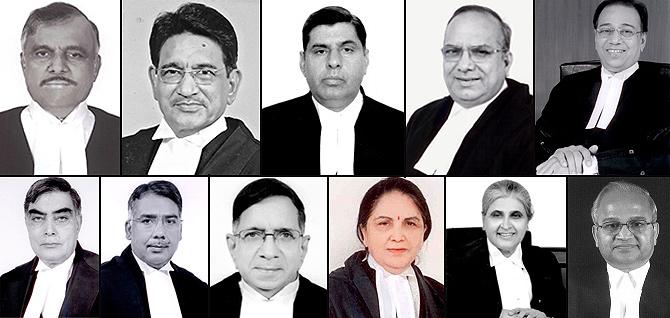 | « Back to article | Print this article |
Will judges' retirement affect the Supreme Court?
As many as 11 judges of the Supreme Court will retire by next year, marking the elevation of as many new judges to the haloed benches of the apex court.
But legal experts are wary about the implications of such a development on the functioning of the court and the progress of the many cases pending before it.
Rediff.com spoke to some of them and here is what they had to say:
Justice Santosh Hegde, former judge of the Supreme Court, said, “This will mean 11 new faces in the Supreme Court. For any new judge, it takes a certain amount of time to get accustomed to the proceedings. The Supreme Court is already overburdened and it has recently increased its strength. But if 11 judges retire at the same, it will create a shake-up.
“The Supreme Court should take such matters into consideration and ensure that the date of birth -- of judges who are due to be elevated -- is taken into consideration. They should ensure that not too many judges retire at the same time. The biggest problem would be for those litigants whose matters have been partly heard by one of the retiring judges. A new judge will have to hear the matter from scratch. I hope the normal precedent is followed and the judges, who are set to retire, complete their matters before they retire.”
Professor Ravi Varma, a senior advocate, believes that such a development is no one’s fault but is a mere co-incidence.
“The government can consider increasing the retirement age of Supreme Court judges by way of an amendment. But I do not recommend that as new faces are needed at the apex court. The Supreme Court will deal with the situation and ensure that litigants are not affected,” he said.
Sanjay Hegde, a senior advocate in the Supreme Court, believes that so many judges retiring at the same time will affect the continuity of proceedings.
“This clearly indicates the lack of planning when judges were elevated to the Supreme Court. Normally the tendency is to promote the senior-most judge of the high court to the Supreme Court. This generally happens when the judge has only two to three years of service remaining. This should be better planned and a longer tenure for judges should be ensured.
“Eleven judges retiring at the same time would mean a shake-up in the proceedings. Pendency in the judiciary is already a problem in India. Certain cases would need to be re-heard when a judge retires half-way through the hearing. I am sure many judges must be aware of this; they will try and complete matters before they retire. I know of some judges who have deliberately refused to hear cases which could take a long time, as they are nearing retirement. These judges are aware of the administrative problems and hence have refused to hear those matters which generally take a long time to complete.
“In both the Keshavananda Bharathi case and the TMA Pai Foundation case, the judgements were pronounced on the last day of Chief Justice S M Sikri's and Chief Justice B N Kirpal's service, respectively. The judges, who were part of a large constitutional bench, did not want the matters to be re-heard at any cost.
“The number of cases before the Supreme Court is increasing and more people are becoming aware of their legal rights. There is a need for continuity, to ensure that so many judges do not retire at one go. I hope the judges due to retire will consider the problem and finish the cases pending before them so that the matters will not have to be re-heard”.
